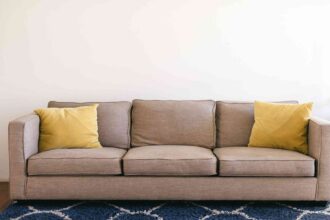Cleaning a velvet sofa is easy and will keep the fabric looking fresh and brand new. To clean liquid spills that haven’t dried yet, use a clean cloth to blot the area dry. Gently rub dried stains with soap and water before air drying your sofa and brushing the velvet to restore the fabric. To clean your entire couch, vacuum it with a handheld vacuum or hose attachment. Once it’s clean, use a fabric protector to keep future stains and spills from damaging the fabric and to clean a velvet sofas.

If your velvet sofa has pressure marks, you can combat these by brushing with the grain, using a soft brush. A steam cleaner may also help with cleaning velvet couch pressure marks away, if your type of velvet is suitable for home cleaning. A few tips how to clean a velvet sofas
Vacuum the sofas:
-
Vacuum your sofa at least once a month to keep dirt from building up:
Regularly vacuuming your sofa is the best way to ensure that surface contaminants don’t work their way into the fabric as people sit or lay down on your furniture. Vacuum your sofa with a handheld vacuum or hose attachment at least once a month to ensure that your sofa stays clean and comfortable. It won’t take more than 5-10 minutes to vacuum your velvet sofa. This way you clean a velvet sofas
-
Use a soft-bristled brush to knock dust and dirt up:
Before vacuuming your sofa, grab a soft-bristled brush or clothing brush. Remove any pillows or blankets from your sofa. Start on one end of the sofa and gently brush in long, even strokes. Cover each section of your sofa 2-3 times to knock up any dust, dirt, or grime that is hiding in your fabric.
-
Vacuum your sofa using a hand vacuum or hose:
Attach the fabric bristles to your hose or hand vacuum. Turn the vacuum on its lowest setting. Start on one end of your sofa and run the vacuum or hose across each pillow by working in vertical or horizontal strips. Move the vacuum in the same direction with each motion to ensure that your fabric is lifted the same way with each stroke. Vacuum the sides of the frame and the top of the pillows and frame to remove all of the dust, dirt, or crumbs. Lift your pillows out and vacuum behind them to remove the crumbs or dust that’s hiding behind the cushions.

Removing Stains and Spot-Cleaning:
-
Address stains, spills, or dirt as soon as you notice them:
To avoid stains from setting into your velvet divan beds, clean them as soon as you spot them. The longer that you allow a contaminant or liquid to sit on your furniture, the more likely it is to stain or permanently damage your velvet.
-
Blot wet spills dry with a clean cloth until they disappear:
If a liquid has been spilled on your velvet, grab a clean, dry cloth. Take your cloth to the affected area and blot the area repeatedly. Tap it gently with the cloth to soak up the excess liquid. When a section of your cloth gets damp move the cloth around in your hand until you find a dry section. Continue doing this until the spill is completely dried out. This is a basic tips to clean a velvet sofas.
- Avoid rubbing the cloth. Moving your cloth back and forth may work the liquid deeper into the fabric.
- You can use paper towels instead of a dry cloth if you prefer, but if the paper towels aren’t highly absorbent, you’ll need to use a lot of them.
- Mix a little soap with water to clean dried stains:If your liquid spill leaves a mark behind after it dries or you notice a dried stain on your sofa, clean it with soap and water. Grab a bowl and fill it with 2–3 cups (470–710 ML) of lukewarm water. Then, add a few drops of unscented dish soap to the water and mix the solution with a spoon until soap bubbles form on the surface of the water.
-
Spot test your cleaning solution in an inconspicuous area:
Take a clean, microfiber cloth and dip it in your soap and water. Then, tap the cloth on an area of your couch that guests can’t see. The section underneath the sofa is best, but you can test it behind the sofa if your furniture is resting against the wall. Tap the velvet with your damp cloth 4-5 times and wait 1-2 minutes to see if the soap damages or stains your fabric.
If the soap and water changes the colour of your fabric, your fabric is probably slob or antique velvet. These types of velvet cannot be cleaned with liquid cleaning products. Contact a professional cleaning service to clean these types of velvet. If the stain in spells in a velvet sofas you must clean a stain on velvet sofas
-
Rub the stained fabric with your cloth using smooth, gentle strokes:
Take your cloth and dip it in the soap and water. Wring it over the bowl to remove the excess water and soap. Then, rub your stained area using gentle taps and soft strokes. Rub the entire area repeatedly until you’ve covered the area 3-4 times. You don’t want to soak your sofa, but you do need to get the entire area a little damp to let the soap remove the stain.
-
Allow the cleaned area to air dry for 30-60 minutes:
If you can, open the window and turn a few fans on to keep the room well-ventilated. Wait at least 30 minutes to give the soap and water time to air out. Once the area looks dry, touch it lightly with the pad of your finger. If it’s still damp, continue to let the area air dry. Wait until the fabric is totally dry before brushing or sitting on your sofa.
-
Scrub the area you cleaned with a soft-bristled brush to restore the velvet:
Grab a soft-bristled brush or clothing brush. Gently brush the dried area using short, flicking motions. This will restore the plush look of the fabric. Continue brushing the area until the stain looks like it is entirely gone and the velvet is in its original condition. If the stain is still visible after brushing it, repeat this process until the stain is entirely gone. You may not be able to remove the stain if it has fully.

How to protect your sofas:
-
Check your sofa’s tag to see if it has already been treated:
Look underneath the sofa and underneath the cushions to find the sofa’s tag. Inspect the tag carefully to see if the velvet has been treated before or not. If it has been waterproofed or treated, consult the manufacturer to see if additional fabric protectors will ruin the sofa.
-
Get a fabric or upholstery protector designed for velvet:
You can purchase a can of fabric protector at a local home goods or big box store. Read the label on a can of fabric protector to see if it is designed to protect fabric. Get a waterproofing fabric protector if you want to completely prevent liquid spills from damaging your sofa in the future. Get a standard fabric protector if you don’t want to change the feel of your velvet. A non-waterproof fabric protector will make your sofa easier to clean and keep it feeling soft. A waterproof fabric protector will prevent liquids from immediately soaking into your fabric, but it isn’t a fool proof fix for liquid spills. Waterproofing aerosol sprays may change the feel of your velvet as well.
-
Test your protector in an inconspicuous area to make sure it’s safe:
Once you bring your fabric protector home, read the instructions on the label carefully to see if there are any special steps that you need to take. Then, take the fabric protector and spray it underneath or behind your sofa to test it. Wait 5-10 minutes to see if it damages your fabric or modifies the colour. If your fabric protector changes the colour of your sofa or damages the fabric, you cannot use it to protect your furniture. Contact a professional cleaning service to find out how they can waterproof your sofa.
-
Mist your sofa with the fabric protector to preserve the fabric.
Velvet doesn’t do well when soaked, so instead of spraying your protector directly into the fabric, mist it by spraying more than 10–12 inches (25–30 cm) away from the surface of the sofa. Press the nozzle or pull the trigger repeatedly while moving the container across the surface of your sofa. Mist each section 3-4 times to apply your fabric protector. If your sofa is in a corner or against a wall, pull it away from the wall before applying your fabric protector.
Wait 1-2 hours to give your fabric protector time to dry:
To give the protector time to work into the fabric, wait at least 1 hour to give it time to dry. Crack a window open or turn the fan on to keep the room well-ventilated while it dries. If your sofa still feels a little damp when you go to check it, let it dry for an additional hour. The your sofas will become in perfect seen.

Conclusion:
Cleaning of sofas is very good habit if you are choose. Every month you should need to vacuum the velvet sofas. To avoid stains from setting into your velvet furniture, clean them soon as you spot them. These are few tips to clean a velvet sofas. We mention above in details.





